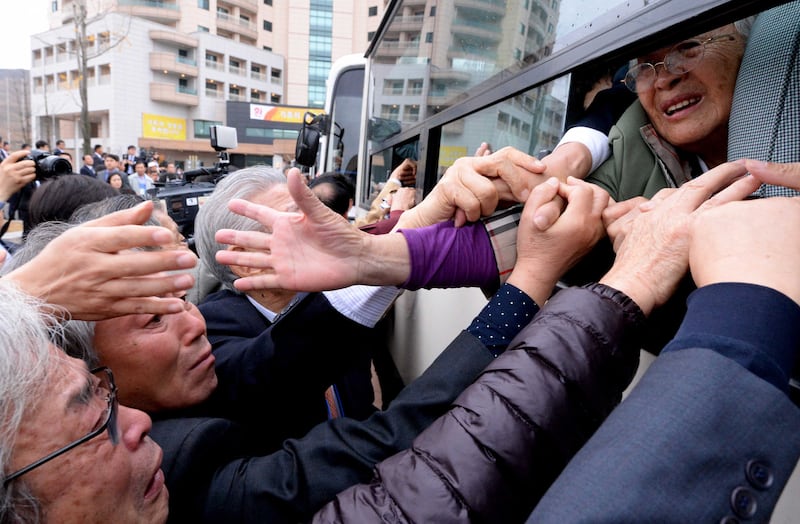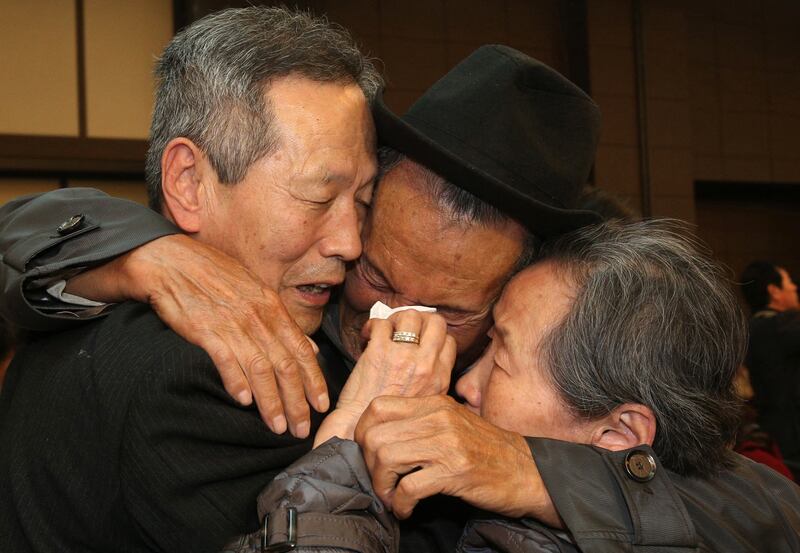TAIPEI, Taiwan – North Korea has begun dismantling a facility where families separated by a decades-old war could meet on the border with South Korea, Seoul said on Thursday, the North’s latest action to highlight what it says is the permanent division of the peninsula.
Occasional reunions of elderly relatives separated during the 1950-53 Korean War were one of the few acts of compassion between the two Koreas and invariably raised hopes for reconciliation.
But relations between North and South Korea have deteriorated to their worst in years as the North pursues its nuclear and missile programmes and threatens to unleash devastation on South Korea and its U.S. ally.
“The government has confirmed that North Korea is demolishing the reunion center for separated families in the North’s Mount Kumgang tourist area, which crushes the desire of separated families to be reunited,” said Koo Byung-sam, a spokesperson at South Korea’s Ministry of Unification, which oversees inter-Korean relations.

The reunion center in North Korea’s Mount Kumgang tourist area, a joint tourism project allowing South Koreans to visit, was built in 2008 with South Korean funding to facilitate meetings between families separated by the Cold War division of the peninsula.
The center became a focus for inter-Korean reconciliation efforts following a 2000 summit between the two nations’ leaders and it hosted several rounds of reunions.
But family reunions were suspended in 2010 after tensions escalated following deadly North Korean attacks on the South’s Cheonan warship and Yeonpyeong Island.
Reunions resumed in 2013 and also took place in 2018 but deteriorating relations as the North focused on its nuclear ambitions put an end to them.
The demolition of the reunion facility reflects a recently launched North Korean drive to sever ties completely with South Korea and rule out once and for all any hope they can ever be reunited.
North Korean leader Kim Jong Un pledged last year to amend the constitution to declare South Korea the “primary and immutable enemy,” abandoning the established notion of the South being a partner in reconciliation and reunification.
Kim added that he no longer saw South Koreans as being members of the same ethnicity.
‘Stop this demolition’
South Korea called on the North to halt its destruction of the facility, Koo said, adding that the South would consider necessary steps, including legal measures.
“The government expresses strong regret over the unilateral demolition of the facility, which was established by agreement between the two Koreas, and strongly urges North Korea to immediately stop this demolition,” he said.
“The North’s unilateral demolition cannot be justified by any excuse, and all responsibility for this situation should be borne entirely by the North Korean authorities,” said the spokesperson.

The Korean War left millions of families separated, with little to no contact mainly due to isolationist North Korea’s restrictions.
Government-arranged reunions, though rare, provided fleeting moments of reconnection, giving tearful relatives the chance to see and embrace long-lost loved ones.
Many family members still hope for a final chance to meet their kin.
As of the end of last year, 97,350 South Korean separated family members had died leaving 36,941 surviving registered separated family members, according to data released by the Ministry of Unification on Jan. 30.
RELATED STORIES
North Korea’s new map erases South Korea, signaling policy shift
North Korea tests cruise missile; warns US, South Korea on ‘provocation’
‘Smart balloons’ drop leaflets, loudspeakers into North Korea
News of the North Korean demolition came a day after U.S. lawmakers reintroduced a bipartisan bill aimed at reconnecting Korean American families with relatives in North Korea.
The legislation directs the U.S. State Department to create a registry of Korean Americans seeking reunions and to prioritize these efforts in future diplomatic discussions with North Korea. Originally introduced in 2024, the bill previously passed the House with strong bipartisan support and now has a companion bill in the Senate.
Advocacy groups supporting the bill emphasize that a national registry is a crucial first step in identifying and connecting separated family members. Lawmakers backing the initiative stress the importance of addressing this long-standing humanitarian issue and ensuring that aging family members have a chance to reunite.
Edited by Mike Firn.
